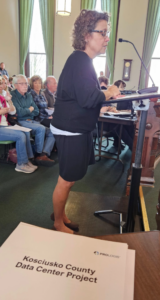
By Dan Spalding
News Now Warsaw
WARSAW — Plans for a data center near Leesburg faced a wall of opposition Wednesday in a rezoning hearing that lasted nearly two and half hours in Warsaw.
A bid to rezone 550 acres that could open the door for the petitioner, Prologis, to construct ten buildings as part of a hyper-scale data center, failed to gain any clear support from the area plan commission’s eight attending members who voted unanimously to recommend against rezoning the farmland to Indutrial 3.
Opponents, led by a group called Keep Leesburg Rural, assailed the plan as an assault on agriculture and argued it was a classic example of spot zoning.
Attorney, Steve Snyder, representing Prologis, compared the current plan to the one that esablished the Louis Dryfes bio fuel plant in Claypool years ago because of the availability of nearby trasporttion.
The land for the data center, Snyder said, is ideal because of the nearby convergence of three massive electric transmission lines needed to run the data center.

Snyder said the project would ramp up over ten years and bring with it 300 high-paying jobs.
He said the jobs and especially the tax revenues would provide hundreds of millions of dollars in tax benefits.
He predicted that over a 10-year span, tax revenues would generate about $335 million from the data center. He compared that to $311,000 in property taxes that would be derived from the existing farm ground over the same 10-year period.
More than 100 people attended the meeting and overwhelmed the few who spoke in favor of the plan.
Those against cited distrust over the plan and the technology, with some contending the company could eventually falter if the emerging technology somehow becomes obsolete, thereby leaving behind a vast parking lot and buildings that would permanently decimate a large swath of prime farm ground.
They also expressed fear that the data center would need much more water for cooling it computers than portrayed by Snyder.
Kassi Rowland compared the zoning process to the TV show, survivors and was adamant in her opposition.
“Spot zoning I3 in the middle of prime farmland is just wrong. It’s reckless. It ignores the vision our county laid out for responsible development. It opens the door for more industrial sprawl that will slowly chip away at our agricultural foundation that supports our county and future generations,” Rowland said.
Many complained about the how the development would ruin the rural environment for many surrounding families and some pointed to the apparent hum or noise that would emmenate from the ten buildings.
One man spoke against all of the emerging technology, saying he believes it is a threat to humanity.
One of the few to speak on behalf of the plan was Peggy Friday, executive director of Kosciusko County Economic Development Corporation, which takes a leadership role in the county’s economic development efforts.
Friday said she believes county officials are looking at the issue closely “to make sure they’re asking the right questions and fully understanding both the economic and community impact.”
She also talked about the benefits such a technology and financial benefits would provide.
She did not outwardly endorse the rezoning, but acknowledged, “This potential investment could significantly enhance our schools, roads and infrastructure, public safety services and other essential community resources.”
Plan Commission President Lee Harman summed up a sense of distrust over the suggested financial windfall and said he worked about the negative impact it would have.
“This phrase that keeps rattling around in my head is that ‘All that glitters is not gold,’ ” Harman said.
“There’s a price to be paid — one way or the other on this,” he said, saying he was worried about those who would be most affected by it.
Ultimately, concern for nearby residents was a big factor.
“What about the other areas around it?” Harman said. “That concerns me and I think it opens a Pandora’s box that I’m not comfortable with at all.”
The recommendation now goes to the county commissioners who have final say on the request.




